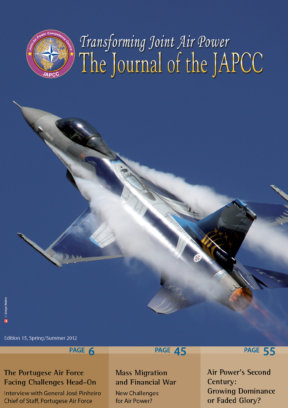Editorial
2012 is an important and challenging year in which many countries have to deal with economic problems, budget cuts and overcome them in order to avoid unprecedented crises that could spread to the rest of the world. In the age of austerity, even the NATO Armed Forces will suffer significant budget cuts. A possible solution is considered to be a ‘Smart Defense’ that could ensure greater security for less money, by working together with more flexibility.
During such a crucial time the JAPCC is increasing its attention towards all Air and Space Power related matters, expanding its liaison to international organizations, institutions and industries involved in changes. The first visit of the Russian Federation to the JAPCC at the end of 2011 fits this view of future cooperation.
In the JAPCC Journal we are always keen on receiving input from outside sources. We are particular in finding relevant points of view from NATO and National military leaders to present to our readers. For that I would like to thank General Pinheiro, Chief of Staff, Portuguese Air Force, and Lieutenant General Kisner, Commander of NSHQ (NATO Special Operation Head Quarters), for their interesting and unique perspective. In this edition of the Journal we further offer our analysis of counter-piracy operations and provide you with an update to this delicate issue. Our Maritime Air expert will present the key results of an experiment conducted in gaining insights into potential commitment levels of A&S ISR platforms in the Region off the Horn of Africa.
The article on Libya gives insight and considerations on the performance of NATO in response to the most recent crisis. It looks at its success in the context of a strategic direction. The speed at which NATO acted on the Libyan crisis is commended; however, the willingness of all nations to contribute in an equal manner is questioned. Once again it is proven that Air Power cannot operate alone, especially with restrictive rules of engagement and the lack of technology to distinguish friend or foe.
Our article on Cyber Threats points out the importance of information flow and how its denial affects kinetic and non-kinetic warfare. Modern communications have become significant force multipliers for commanders. These same tools are weapons of destruction for adversaries keen on effecting our operations silently, without stepping onto the battlefield.
Air Power’s Second Century is an article presented by Professor Sabin, a guest speaker at our Joint Air & Space Power Conference 2011. He takes a look at where Air Power stands as it enters its second century. Professor Sabin focuses on four aspects of military strategy to balance conflicting views of whether the best days of Air Power are behind or in front of us.
Alessio Cecchetti
Brigadier General, IT AF
Assistant Director Capabilities, JAPCC









